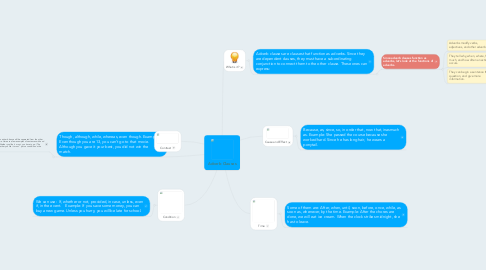Adverb Clauses
by DjCesar Barrios


1. Though, although, while, whereas, even though. Example: Even though you are 13, you can’t go to that movie. Although you gave it your best, you did not win the match.
1.1. Most of the time, an adverb clause will be separated from the other clause with a comma. Here are a few examples of sentences with and without commas: Whether you like it or not, you have to go. (The adverb clause “Whether you like it or not” puts a condition on the action.)
2. Condition
2.1. We can use: If, whether or not, provided, in case, unless, even if, in the event. Example: If you save some money, you can buy a new game. Unless you hurry, you will be late for school.
3. Contrast
4. Cause and Effect
4.1. Because, as, since, so, in order that, now that, inasmuch as. Example: She passed the course because she worked hard. Since he has long hair, he wears a ponytail.
5. Time
5.1. Some of them are: After, when, until, soon, before, once, while, as soon as, whenever, by the time. Example: After the chores are done, we will eat ice cream. When the clock strikes midnight, she has to leave.
6. What is it?
6.1. Adverb clauses are clauses that function as adverbs. Since they are dependent clauses, they must have a subordinating conjunction to connect them to the other clause. These ones can express:
6.1.1. Since adverb clauses function as adverbs, let’s look at the functions of adverbs.
6.1.1.1. Adverbs modify verbs, adjectives, and other adverbs.
6.1.1.2. They tell why, when, where, how, how much, and how often an action occurs.
6.1.1.3. They can begin a sentence that is a question, and give more information.
